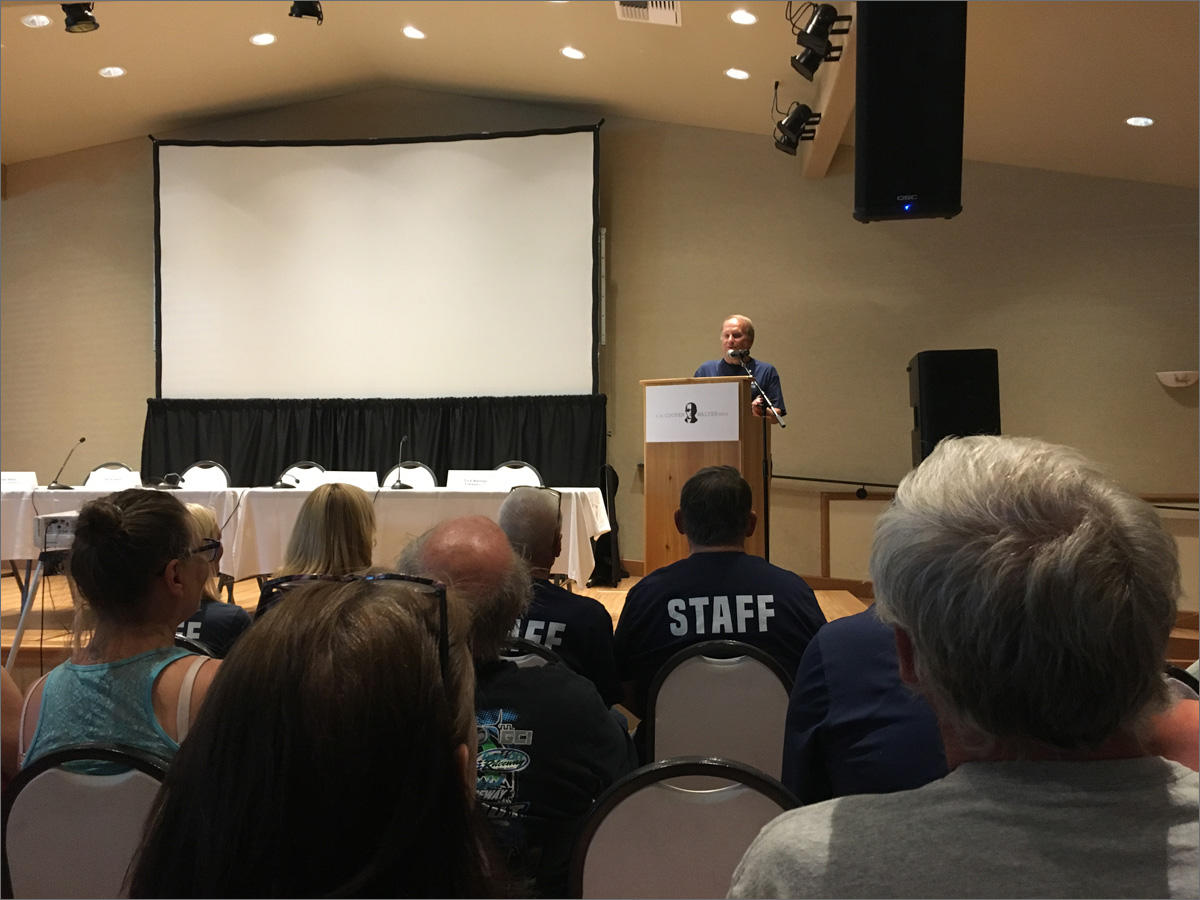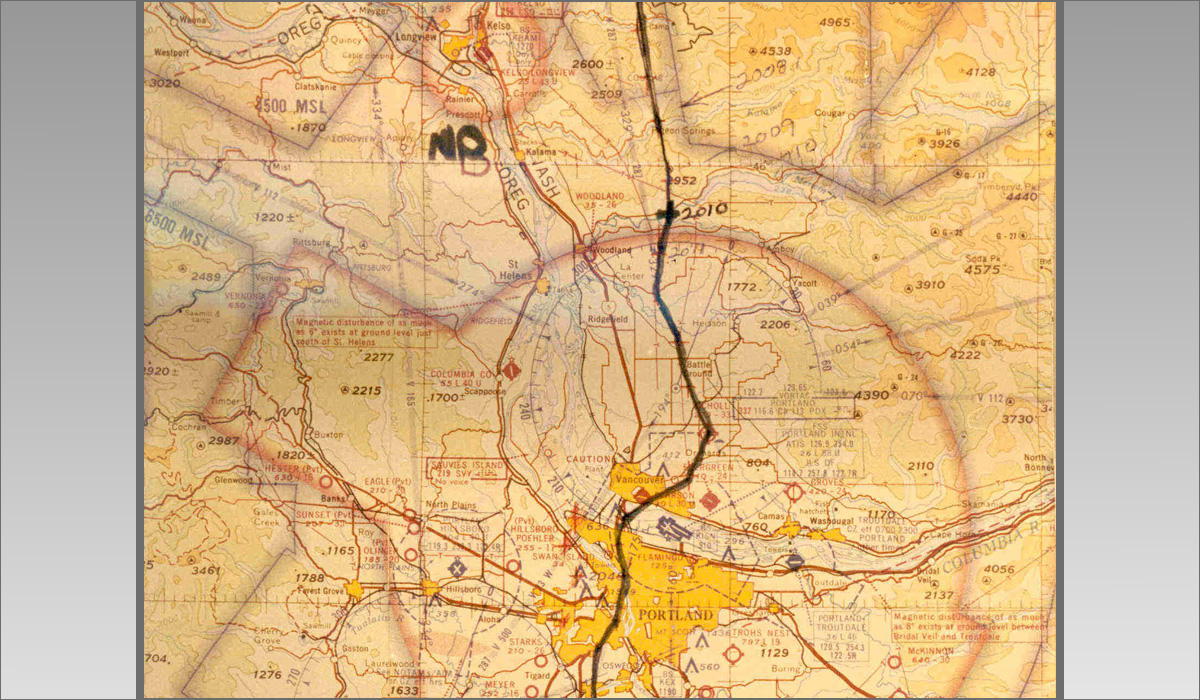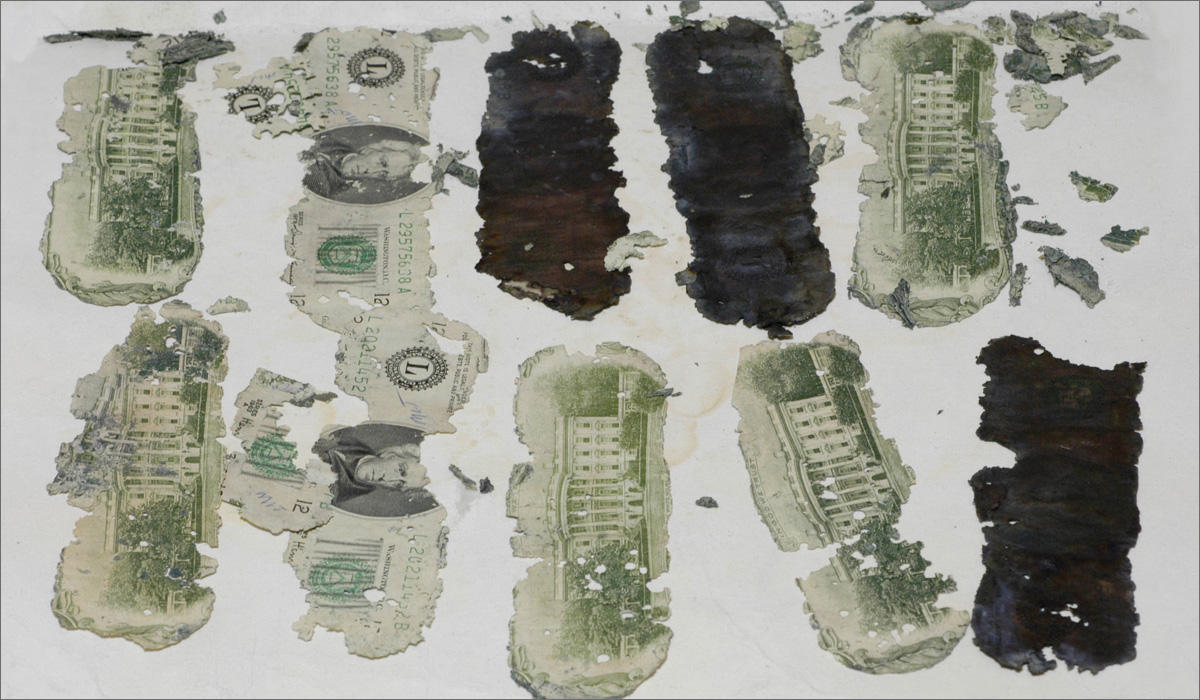
The legend and theorizing about Northwest skyjacker D.B. Cooper just won’t die.
A new documentary about the unsolved 1971 hijacking introduces a new twist to the tale. It suggests we might have been looking for D.B. Cooper and his loot in the wrong place for all these years.
The makers of the four-part video literally rolled out a red carpet for the sold-out premiere of “D.B. Cooper: The Real Story.” It happened at a community center in Cle Elum, Washington on Saturday.
The town in the eastern foothills of the Cascades was chosen deliberately because Cle Elum is the closest town to where former Army paratrooper Walter Reca said he landed after he jumped out of a hijacked Boeing 727 with a $200,000 ransom tied to his chest.
Decades later, Reca confessed to a close friend and to a niece that he committed the hijacking under the pseudonym Cooper and made a clean getaway.
He allowed himself to be recorded by the friend, Carl Laurin, with the understanding that the secret not be revealed until after Reca’s death, which came in 2014.
The written and recorded confessions are at the heart of the new documentary and a book released in May that covers the same ground, both from Michigan-based publisher Principia Media.
If you remember your D.B. Cooper lore, you’ll know the jump zone has always been assumed to be over southwest Washington, close to Portland.
The airline, the FBI and amateur sleuths have analyzed the flight path many times. No one else has placed the jump over central Washington.
The 84-year-old Laurin asserts the FBI “bungled” this high profile case or purposely misdirected searchers away from the correct jump zone.
“Do I believe that there was a cover up here?” Laurin asked rhetorically in an interview. “Let me put it this way, it’s the only honest answer I can come up with. D.B. Cooper jumped over Cle Elum.”

On the afternoon of November 24, 1971, Cooper boarded a Northwest Orient Airlines plane in Portland with a one-way ticket to Seattle. He passed a note to a stewardess indicating he had a bomb in his briefcase.
He subsequently negotiated to exchange the passengers in Seattle for $200,000 in ransom and four parachutes. He also got the authorities to refuel the plane and said he wanted to be flown to Mexico.
Shortly after takeoff from Seattle, the remaining flight crew—which had retreated to the cockpit —noticed a warning light indicating deployment of the jet’s aft stairs.
Cooper is believed to have jumped from the stairs a few minutes later at an altitude of 10,000 feet into a frigid Thanksgiving Eve storm.
He was never seen again. The plane landed safely in Reno, Nevada, for a planned refueling stop a few hours later.
The FBI effectively closed the D.B. Cooper case in 2016. The bureau said it won’t re-open the cold case unless someone comes up with relevant physical evidence such as the parachutes the hijacker used or ransom money.
The makers of the new documentary found neither of these things. There are some other discrepancies in their story including Reca’s age at the time of the hijacking, 38 years old, which is on the young side of the estimates from passengers and airline employees interviewed by the FBI. They figured the skyjacker was in his mid-40s.
“Although the FBI appreciates the immense number of tips provided by members of the public, none to date have resulted in a definitive identification of the hijacker. The tips have conveyed plausible theories, descriptive information about individuals potentially matching the hijacker, and anecdotes—to include accounts of sudden, unexplained wealth,” FBI-Seattle Division spokesperson Jillian Voigt wrote in an email Monday. “In order to solve a case, the FBI must prove culpability beyond a reasonable doubt, and, unfortunately, none of the well-meaning tips or applications of new investigative technology have yielded the necessary proof.”
Voigt’s email on Monday in response to questions about the Principia Media documentary used the exact same words as a statement from two years ago explaining the FBI’s redirection of its resources to other investigative priorities.
Various FBI agents over the years have reportedly concluded that D.B. Cooper probably did not survive the jump from the plane.
Principia Media’s investigators faced a challenge in reconciling the getaway story they accepted with one of the undisputed facts of the D.B. Cooper case, namely how did a cache of the ransom money get buried in a sandbank along the Columbia River north of Portland.
In 1980, a boy digging a campfire pit at Tena Bar uncovered three bundles of decomposing $20 bills, whose serial numbers traced back to the D.B. Cooper ransom money.

Laurin and the documentary makers posit that an appreciative Reca gave his getaway driver a bundle of bills and that the accomplice later buried the loot at Tena Bar to dispose of evidence that connected the driver to the hijacking.
Reca is the latest in a line of at least a dozen previous suspects publicly accused by friends and relatives or self-confessed to be D.B. Cooper.
The new documentary presents other details that make Reca a plausible suspect. He had nighttime parachuting experience, survival training, a criminal background (he previously committed armed robbery) and a motive (tired of being poor).
Self-appointed investigator Laurin managed to locate an eyewitness who, with some prompting, corroborated Reca’s getaway. That eyewitness is a Cle Elum musician and former logging company truck driver.
Jeff Osiadacz now believes he unwittingly helped D.B. Cooper summon a getaway driver to the roadside café where they were the only customers on Thanksgiving Eve 1971.
“He come in and the first thing he said is, ‘Hey kid, where am I?’” Osiadacz recalled. “I said, ‘You’re about four miles east of Cle Elum.’ And he says, ‘If I make a phone call, can you give a friend directions how to pick me up?’ I says, ‘Sure, no problem.'”
At the time, the musician didn’t suspect the soaking wet, odd, limping man was anything more than “a French fry short of a happy meal.”
“Never saw him again, never know nothing,” Osiadacz told public radio. “The next day, they’re advertising this guy that jumped out an airplane, all this on the news media. They’re showing these composite sketches and everything. Didn’t look nothing like the man I was sitting with.
Reca told Laurin he removed and bundled up his parachute after he landed outside Cle Elum and covered it up with branches.
There are no accounts of anyone finding a parachute in that area, which might have been newsworthy at the time given the intense coverage of the hijacking.
Reca said he limped for about a half-hour in the direction of the closest lights he saw during his descent, which Laurin deduced to be the Teanaway Junction Café.
At the café, Reca recalled meeting a musician in a cowboy outfit, now believed to be Osiadacz. The cafe no longer exists.
After spending two-and-a-half years investigating the D.B. Cooper case and making his documentary, filmmaker Dirk Wierenga said he is confident they fingered the right guy.
“I’m a 100 percent (confident),” Wierenga said in an interview Saturday. “I gotta tell you every other story that is out there is voodoo. They’re all voodoo.”